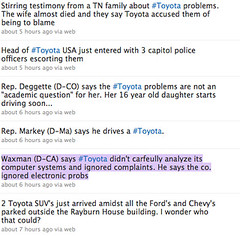It was hard to miss: The White House confab this week with the warring sides in Congress meeting over the heated issue of health care reform. National shows and local stations each weighed creative approaches to coverage:
KQED in San Francisco (home city of Rep. Nancy Pelosi, D-Calif., who has been a leading advocate of health care reform), put together a page for comments and a live blog of the event. The Sunlight Foundation provided a tool to track donations to members of congress Congressional representatives as they spoke during the summit.
Tennesee had three representatives in their delegation: – two republicans and one democrat, some open to compromise on the health care bill, and one, Sen. Lamar Alexander (R-Tenn.), who made the case as other Republicans did to “start from scratch,” as WPLN in Nashville, with Capitol News Connection reported .
Nashville is a hub for the health care industry, which doesn’t seem to be hurting as the health care reform debate continues. WPLN reported that four major health are providers in Nashville, including HealthStream, posted positive year-end financial results.
But the urgency of health care reform certainly hasn’t gone away with a few hours of debate at the White House. As WAMC in Albany, NY found, thousands of people in New York alone are at risk without some serious changes:
The failure to enact health care reform this year will lead in the next decade to approximately 13,900 premature deaths of people between 25 and 64 years old in New York according to a report released today by the consumer health group Families USA.
Similar stories are cropping up around the country. For a full video roundup of health care coverage, PBS has a collection of clips from Frontline, NewsHour and more.

